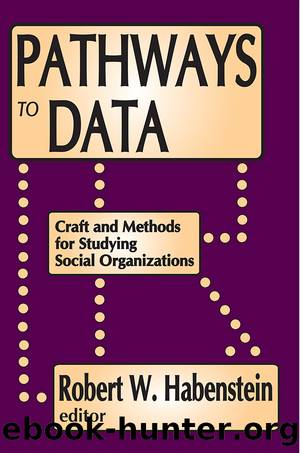Pathways to Data by Robert W. Habenstein

Author:Robert W. Habenstein [Habenstein, Robert W.]
Language: eng
Format: epub
ISBN: 9781138529588
Google: pYKLtAEACAAJ
Barnesnoble:
Goodreads: 2274133
Publisher: Routledge
Published: 2008-05-01T00:00:00+00:00
A Note About Evaluation Studies
One of the more important functions of sociologists employed in correctional systems is the evaluation of program effectiveness.17 Indeed, the world at large, and particularly the legislatures and the executive branches of government that approve budgets, demand evaulation of the correctional system as of all government bureaucracies. The evaluation is seldom if ever attempted with the hope of proving a program to be of no value; on the contrary, evaluations are often in the nature of disguised demonstrations of an innovationâs payoff. However, it is not undue cynicism to expect the most likely outcome of an evaluation of a new programâs effectiveness to be something less than a demonstration of its potency. This is particularly so if the criterion of a programâs effectiveness is the reduction of postrelease criminality, which in turn is measured by the rate of returns to prison. A review of studies in the immediate past will not reveal many that show differences in postrelease performance clearly in favor of the treatment group.
The more interesting aspects of such studies, however, may lie in the investigation of the manner in which policy and discretionary decisions influence the rate of return to prison from parole. The sociologist who seeks to account for variation in postrelease returns to prison should examine the nature of the decision-making at the time the prisoner is considered for parole. In particular, how is the prehearing summary of the inmateâs record prepared? What, if any, are the risk level and other release criteria used by the parole board in reaching its decision? (And what are the characteristics of the prisoners not released compared with those who do secure parole?) What are the general policy considerations with respect to given offenses or offenders? For example, is the public demanding greater protection from persons with histories of violence? Is the state or municipal government conducting a drive on certain kinds of offenses in connection with an election or other political event? Similarly, how are revocations of parole handled and where is relevant policy effectively determined? And who constitutes the parole board? What is the pattern of relationships between police and parole officers? What are the procedures actually followed in revoking paroles? Finally, what happens to the person whose parole is revoked and who is returned to prison (particularly, does he drop from the sample at that point, or is he retained in the follow-up in some way)? Without a fairly detailed consideration of organizational factors in the administration of parole, the postrelease survival rate of former inmates may be interpreted in a truncated manner (as a funtion of parole behavior solely) and the subtle complexities of the organization of the total correctional system may be missed. This requires not only primary data collection (observation, interviews, etc.) with actors in various positions (inmates, staff, parolee, parole board, parole officer, significant others in the parolee scene) but also some overall model of the functioning of a system of criminal justice.
Download
This site does not store any files on its server. We only index and link to content provided by other sites. Please contact the content providers to delete copyright contents if any and email us, we'll remove relevant links or contents immediately.
Collaborating with Parents for Early School Success : The Achieving-Behaving-Caring Program by Stephanie H. McConaughy; Pam Kay; Julie A. Welkowitz; Kim Hewitt; Martha D. Fitzgerald(896)
Entrepreneurship Education and Training: The Issue of Effectiveness by Colette Henry Frances Hill Claire Leitch(664)
Adding Value to Policy Analysis and Advice by Claudia Scott; Karen Baehler(499)
Materializing the Middle Passage by Jane Webster;(496)
Race and American Political Development by unknow(488)
Sociological Perspectives of Health and Illness by Constantinos N. Phellas(477)
American Government and Politics Today by Steffen W. Schmidt Mack C. Shelley Barbara A. Bardes(475)
Human and Global Security : An Exploration of Terms by Peter Stoett(460)
Control Of Oil - Hardback by Kayal(457)
The Disappearance of Rituals: A Topology of the Present by Byung-Chul Han(398)
Advances in Child Development and Behavior, Volume 37 by Patricia J. Bauer(395)
The Catholic Church and European State Formation, AD 1000-1500 by Jørgen Møller(388)
The World According to China by Elizabeth C. Economy(379)
Theories of Counseling and Psychotherapy: A Case Approach by Nancy L. Murdock(370)
Left Is Not Woke by Susan Neiman(366)
Application of classical statistics, logratio transformation and multifractal approaches to delineate geochemical anomalies in the Zarshuran gold district, NW Iran by unknow(362)
Turkey's Relations with the West and the Turkic Republics: The Rise and Fall of the Turkish Model by Idris Bal(352)
Cross-Cultural Child Development for Social Workers by Lena Robinson(348)
Japan's Ainu Minority in Tokyo by Mark K. Watson(330)
